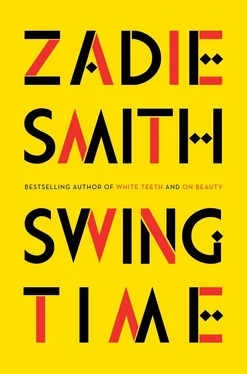“It’s you,” she said. She put a protective hand to the back of her baby’s head.
“Tracey, we need to talk.”
“MUM!” cried a voice from inside. “WHO IS IT?”
“Yeah, well, I’m in the middle of making lunch?”
“My mother is dying,” I said — that old childhood habit of exaggeration spontaneously came back to me—“and you’ve got to stop what you’re—”
Just then her two older children stuck their heads round the door to stare at me. The girl looked white, with wavy brown hair and sea-green eyes. The boy had Tracey’s coloring and a springy Afro but didn’t look especially like her: he must have taken after his father. The baby was far darker than all of us, and when she turned her face toward me I saw she was Tracey’s double and incredibly beautiful. But they all were.
“Can I come in?”
She didn’t answer. She sighed, pushed the door open with her slippered foot and I followed her in.
“Who are you, who are you, who are you?” the little girl asked me and before she got an answer slipped her hand into mine. I saw, as we walked through the lounge, that I had interrupted a screening of South Pacific . This detail moved me, and made it hard to keep in mind the hateful Tracey of the e-mails or the Tracey who had put that letter through my door ten years before. I knew the Tracey who wasted an afternoon on South Pacific and I loved that girl.
“You like it?” her daughter asked me, and when I said I did, she pulled my arm till I sat on the settee between her and her older brother, who was playing on a phone. I had marched down Brondesbury Park full of righteous fury, but now it seemed completely possible that I might just sit on this sofa and pass the afternoon watching South Pacific with a little girl’s hand nestled in mine. I asked her for her name.
“Mariah Mimi Alicia Chantelle!”
“Her name’s Jeni,” said the boy, without looking up. I thought he looked to be eight, and Jeni five or six.
“And what’s your name?” I asked, cringing to hear my mother’s voice in me, talking to all children, whatever their age, as if they were barely sentient.
“My name is Bo!” he said, imitating my intonation, making himself laugh — the laugh was pure Tracey—“And what is your story, Miss Woman? Are you from the Department of Social Care?”
“No, I’m a… friend of your mum’s. We grew up together.”
“Hmmm, maybe,” he said, as if the past were a hypothetical he could take or leave. He reapplied himself to the game he was playing. “Never seen you before, though, so I got my SUSPICIONS.”
“This bit is ‘Happy Talk’!” said Jeni, delighted, pointing at the screen, and I said, “Yes, but I have to talk to your mummy,” although everything in me wanted to stay on the sofa, holding her hot little hand, feeling Bo’s knee resting inadvertently against mine.
“OK, but come back straight after you do your talking!”
• • •
She was clattering around the kitchen with her baby daughter on her hip and didn’t pause when I entered.
“Great kids,” I found myself saying, as she piled plates and gathered cutlery. “Sweet — and sharp.”
She opened the oven; it almost scraped the opposite wall.
“What you making?”
She forced the door shut again and with her back to me shifted her baby to her opposite side. Everything was the wrong way round: I was the solicitous, apologetic one, she in a place of righteousness. The flat itself seemed to draw this submissive role out of me. On the stage of Tracey’s life I had no other role to play.
“I really need to talk to you,” I said again.
She turned round. She had a proper face on, as we used to say, but when we caught each other’s eyes we smiled, it was involuntary, a mutual smirk.
“I’m not even laughing, though,” she said, reassuming her face, “and if you’ve come in here just to start one with me you best just leave again ’cos I’m not up for it.”
“I came here to ask you to stop harassing my mother.”
“Is that what she told you!”
“Tracey, I read your e-mails.”
She put the baby over her shoulder and started jiggling it and patting its back over and over.
“Listen, I live in this area,” she said, “unlike you. I see what goes on. They can talk it up in Parliament all they like, but I’m on the ground in here, and your mother’s meant to be repping these streets. She’s on TV every other night, but you see anything different round here? My boy’s got a 130 IQ — all right? He’s been tested. He’s ADHD, his brain goes so fast, and he’s bored every day in that shithole. Yeah, he gets into trouble. Because he’s bored. And all these teachers can think to do with him is expel him!”
“Tracey, I don’t know anything about that — but you can’t just—”
“Oh, stop stressing, make yourself useful. Help me get these plates in.”
She handed me them, put the cutlery on top and directed me back to the living room, where I found myself setting the small, round table for her family, just as I had once set teatime for her dolls.
“Luncheon is served!” she said, in what seemed to be an imitation of my voice. Playfully she slapped both the older children round the back of their heads.
“If it’s lasagne again I’m gonna start crying on my knees,” said Bo, and Tracey said, “It’s lasagne,” and Bo assumed the position and comically beat the floor with his fists.
“Get up, you joker,” said Tracey, and they were all laughing, and I did not know how to continue in my mission.
At the table I sat quietly while they argued and laughed over every little thing, everybody seeming to talk as loudly as possible, swearing freely, and the baby still on Tracey’s knee, being bounced up and down while Tracey fed herself one-handed and bantered with the other two, and perhaps this was how their lunch times always were, but I couldn’t rid myself of the suspicion that it was also, on Tracey’s part, a form of performance, a way of saying: Look at the fullness of my life. Look at the emptiness of yours.
“Are you still dancing?” I asked suddenly, interrupting them all. “I mean, professionally?”
The table went quiet and Tracey turned to me.
“Do I look like I’m still dancing?” She looked down at herself and around the table and laughed harshly. “I know I was the smart one but… get a fucking clue.”
“I–I never told you, Trace, but I saw you in Showboat. ”
She did not look remotely surprised. I wondered whether she had spotted me at the time.
“Yeah, well, that’s all ancient history. Mum got ill, there was no one to look after the kids… it got too hard. I’ve had some health issues myself. Wasn’t for me.”
“What about their dad?”
“What about their dad what?”
“Why can’t he look after them?” I was pointedly using the singular, but Tracey — always alert to euphemism or hypocrisy — was not fooled by it.
“Well, as you can see, I tried vanilla, café au lait and chocolate, and you know what I figured out? On the inside, they’re all the fucking same: men.”
I was rattled by her language, but the kids — their chairs turned toward South Pacific —did not seem to notice or care.
“Maybe the problem is the kind of men you choose.”
Tracey rolled her eyes: “Thank you, Dr. Freud! Hadn’t thought of that! Any other pearls of wisdom for me?”
I kept quiet and ate my lasagne, still partially frozen in the middle, but delicious. It reminded me of her mother and I asked how she was.
“She died, a couple of months ago. Didn’t she, princess? She died.”
Читать дальше












